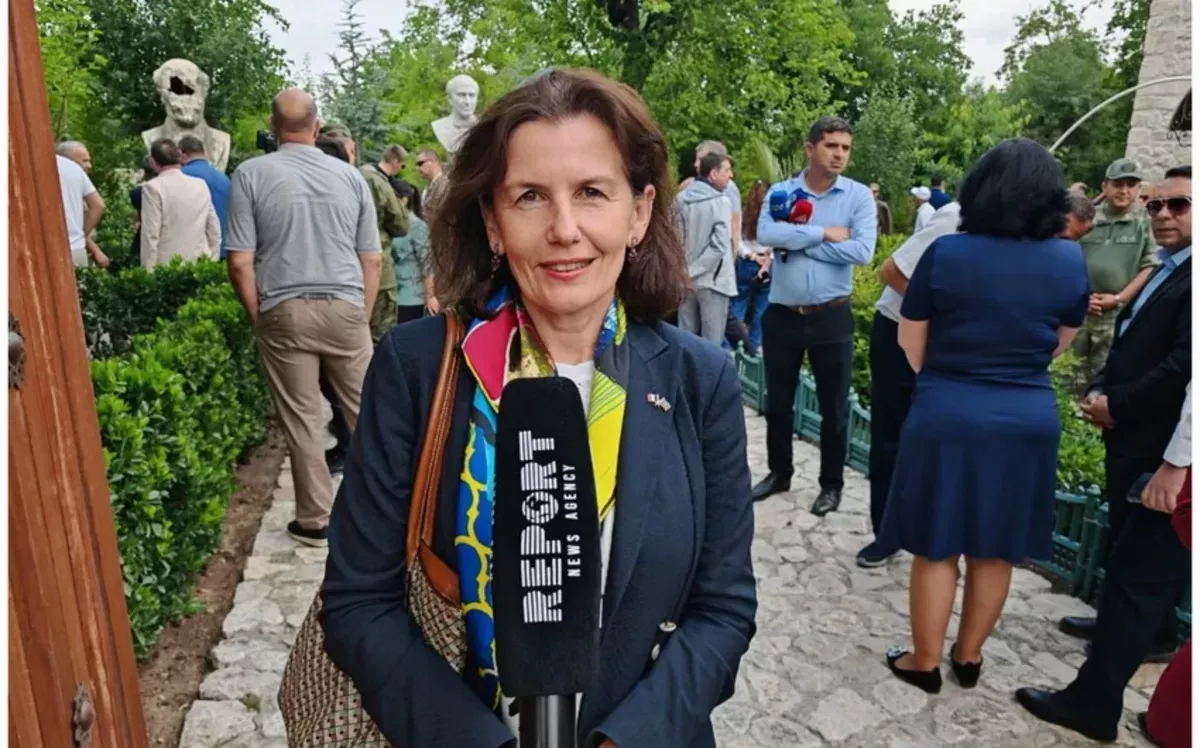Capitulation on fragile shoulders Lessons from Anne Boillon’s tenure in Azerbaijan
It has already been two weeks since former French ambassador Anne Boillon left Azerbaijan. Amidst global events, we somehow forgot to dedicate a few lines to this woman. Today, we are pleased to correct this omission.
It would be inaccurate to say that Madame Boillon, who is personally quite pleasant in appearance, left a particularly favourable impression. Yet, much of this was not entirely her fault. As is well known, an ambassador represents the positions of their home country. France under President Macron has maintained an openly hostile stance towards Azerbaijan, and this inevitably influenced Boillon’s work during her tenure.
At the same time, it must be admitted that, unlike Iran’s representative in Armenia, Mehdi Sobhaní, she refrained from outright lawlessness. Nevertheless, in all her actions, one could sense directives coming from the Orsay waterfront. Boillon began her mission in Azerbaijan in January 2023. At that time, the French political establishment and press were experiencing yet another bout of Azerbaijanophobia in connection with the action of Azerbaijani eco-activists on the Lachin road, which they portrayed as a road closure and would later label nothing less than the “blockade of Nagorno-Karabakh.”
Anne Boillon immediately threw herself into defending France’s interests, it must be said, at the cost of her own diplomatic reputation. In July of the same year, Boillon quoted the then-head of EU diplomacy, Josep Borrell: “It is incumbent on the Azerbaijani authorities to guarantee safety and freedom of movement along the Lachin corridor imminently and not to permit the crisis to escalate further.”
In this way, French diplomacy once again demonstrated its ineffectiveness—after all, it is the ambassador’s duty to help foster relations between countries, not to lecture the host nation. However, in Paris, this was done deliberately, with the intention of signalling disregard for Azerbaijan. Yet the cost of this neglect proved high, because in the end it was the French who were forced to do what was impossible for them. And the burden of this shame fell upon Boillon’s fragile shoulders.

The reference, of course, is to the “Shusha issue.” For four years, Paris resisted sending its representative to the liberated jewel of Karabakh—presumably not only as an expression of its position, but also to avoid upsetting its Armenian-origin electorate. However, in June of this year, Baku managed to overcome this “stronghold” as well. Whether further refusal to visit Shusha would have appeared indecent, or whether the French feared potential repercussions for their investments, in June Boillon, as if nothing had happened, travelled to Shusha and lavished generous compliments on this ancient city.
"Indeed, I feel a great sense of joy being here. I know that Shusha holds a special place for Azerbaijan, since this city is a symbol of culture and art. In addition, Shusha has given the world many famous people," she said.
How symbolic it was that the diplomat not only managed to visit Shusha but also witnessed a significant breakthrough in the normalisation between Baku and Yerevan, despite Paris’s efforts—efforts for which she herself had to bear the consequences.
One is reminded of August 2023, when a “detachment” of French political and public figures approached the hypothetical border, accompanied by the comical sight of Armenian trucks aided by the French. Despite the absurdity of the situation, from Paris’s perspective, it was a formal protest, and Anne Boillon was summoned to the Azerbaijani Ministry of Foreign Affairs, where she was handed a note of protest—not the first, nor the last, during her tenure in Azerbaijan. By the number of summonses to the Azerbaijani MFA, Boillon, together with her predecessor Zacharie Gross, is probably a record-holder. I do not know whether diplomats have a tradition of collecting protest notes, but if such a tradition existed, Anne Boillon could have assembled an entire dossier out of them.
Madame Boillon is still quite young. We are not a vindictive people, and therefore we wish her a successful continuation of her diplomatic career, hoping that the experience she gained in Azerbaijan will serve as a valuable asset in her future endeavours.








